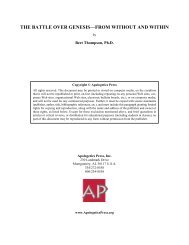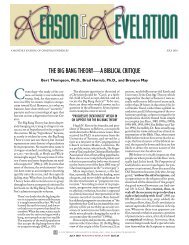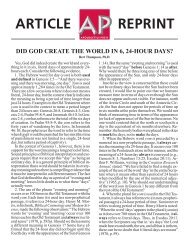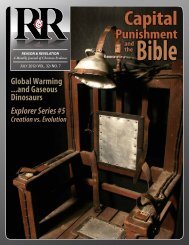The Many Faces, and Causes, of Unbelief - Apologetics Press
The Many Faces, and Causes, of Unbelief - Apologetics Press
The Many Faces, and Causes, of Unbelief - Apologetics Press
Create successful ePaper yourself
Turn your PDF publications into a flip-book with our unique Google optimized e-Paper software.
When I reached intellectual maturity <strong>and</strong> began to<br />
ask myself whether I was an atheist, a theist, or a pantheist;<br />
a materialist or an idealist; a Christian or a freethinker;<br />
I found that the more I learned <strong>and</strong> reflected,<br />
the less ready was the answer; until, at last, I came to<br />
the conclusion that I had neither art nor part with<br />
any <strong>of</strong> these denominations, except the last. <strong>The</strong> one<br />
thing in which most <strong>of</strong> these good people were agreed<br />
was the one thing in which I differed from them. <strong>The</strong>y<br />
were quite sure they had attained a certain “gnosis”—<br />
had, more or less successfully, solved the problem <strong>of</strong><br />
existence; while I was quite sure I had not, <strong>and</strong> had a<br />
pretty strong conviction that the problem was insoluble....<br />
This was my situation when I had the good fortune to<br />
find a place among the members <strong>of</strong> that remarkable<br />
confraternity <strong>of</strong> antagonists, long since deceased, but<br />
<strong>of</strong> green <strong>and</strong> pious memory, the Metaphysical Society.<br />
Every variety <strong>of</strong> philosophical <strong>and</strong> theological<br />
opinion was represented there, <strong>and</strong> expressed itself<br />
with entire openness; most <strong>of</strong> my colleagues were<br />
–ists <strong>of</strong> one sort or another.... So I took thought, <strong>and</strong><br />
invented what I conceived to be the appropriate title<br />
<strong>of</strong> “agnostic.” It came into my head as suggestively<br />
antithetic to the “gnostic” <strong>of</strong> Church history, who pr<strong>of</strong>essed<br />
to know so much about the very things <strong>of</strong> which<br />
I was ignorant; <strong>and</strong> I took the earliest opportunity <strong>of</strong><br />
parading it at our Society.... To my great satisfaction,<br />
the term took.... This is the history <strong>of</strong> the origin <strong>of</strong> the<br />
terms “agnostic” <strong>and</strong> “agnosticism” (1894, pp. 239<br />
240, italics in orig.).<br />
Huxley cannot be accused <strong>of</strong> inventing the term “agnostic”<br />
in a cavalier fashion. Nor can he be accused <strong>of</strong> harboring<br />
a “hidden agenda.” He knew exactly what he was doing, <strong>and</strong><br />
went about doing it in a most public fashion. He spoke <strong>of</strong>ten<br />
to “working class folks,” frequently presenting lunchtime lectures<br />
at factories. In a letter to a friend written on March 22,<br />
1861, he remarked: “My working men stick by me wonderfully.<br />
By Friday evening they will all be convinced that they<br />
-16

















